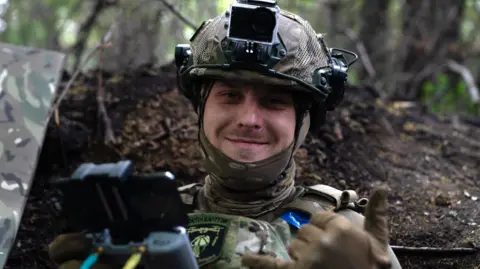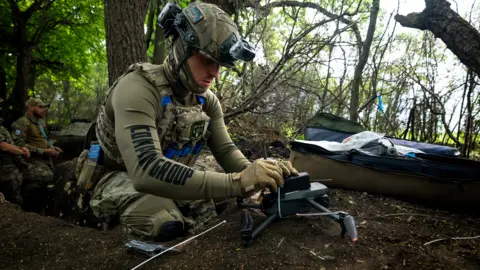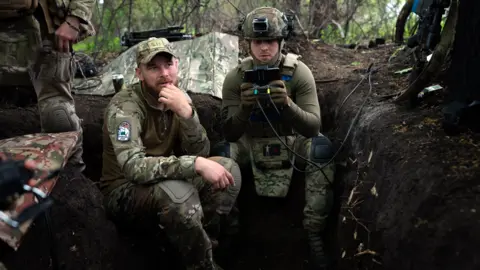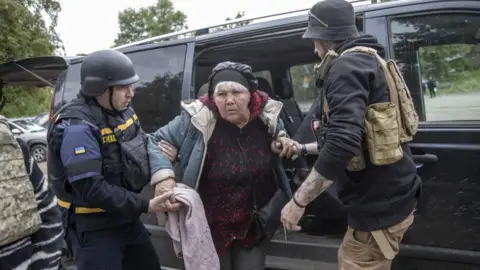In the village of Lyptsi, Ukrainian forces appear to have blunted Russia’s surprise offensive.
A few weeks ago, they were rapidly advancing towards Kharkiv. But with the help of reinforcements Ukraine is slowly stemming the tide.
The threat from the north though has not gone away. Lyptsi is still a target.
There’s the heavy thud of shells landing nearby as we drive at speed through its ruined and deserted streets with an elite Ukrainian unit.
Two of the team point shotguns out of the window. They scan the sky for kamikaze drones. They’ve become one of the most potent weapons of this war.
This Ukrainian unit are about to use them too. They call themselves the Peaky Blinders, after the cult TV series.
Oleksandr, their leader, says at the outbreak of the war they turned up to guard their streets with shotguns, wearing civilian clothing. He says it was like a scene from the hit show.
But they’re no longer a rag-tag team of volunteers. They’re now battle-hardened and have been trained by Western special forces. They’re now the high-tech Peaky Blinders, using cheap, mass-produced small drones.
Nevertheless, they’ve kept the name and wear flat caps in camouflage, with their motto embroidered on the back – “To Find and Destroy”.

Over the past few weeks Oleksandr has literally been fighting for his home.
He used to farm the fields nearby their dug-out – hidden in a tree line. Before the war, he grew strawberries here. But now he’s planting bombs.
Since the offensive began, the Peaky Blinders team say they have killed or injured more than 100 Russian soldiers.
They operate like a small air force with dozens of drones and an arsenal of bombs – ones to take out tanks, others to target groups of infantry or individual soldiers.
They either drop the bombs or use kamikaze drones which they fly directly into a target. They’re also known as First Person View, or FPV drones.

On the day we visit they’re struggling to find new targets.
It’s evidence they’re having some success. The Russians are hiding.
To fill the time, they use one of their larger drones to disarm troops they’ve already killed. Fitted with a grappling hook, they eventually manage to snatch an assault rifle beside a dead Russian soldier.
They’re not just killing, but taking weapons too.
Drones have transformed this war to a point.
But Anton, Oleksandr’s older brother, knows they’re not enough to defeat the Russians.
“We can hold them back with drones and hurt them,” he says, “but not, unfortunately, to win with them”.
He says longer-range weapons targeting the build-up of Russian forces over the border “could have prevented this offensive.”

The Russians too, like them, have worked out ways to jam their signals using electronic warfare.
When the Peaky Blinders eventually do find a new target, their signal gets blocked before they can go in for the kill. They can lose four or five drones in a day.
Despite the setbacks, Oleksandr says the Kharkiv offensive has given his tired men a second wind. Before, they feared the world was losing interest. But he knows that’s still a danger, with no end in sight.
He says he expects the conflict to last a very long time “maybe for several years or even decades”. Neither side, he says, has the strength to deliver a knockout blow. To push the Russian’s back to their border he says Ukraine will need “colossal” Western support.
But for now, this latest Russian offensive is being thwarted.
Oleh Syniehubov – head of Kharkiv’s military administration – believes the original plan was to go all the way to the city of Kharkiv. He told the BBC that recently captured Russian soldiers had revealed their goal was to take the town of Vovchansk in two days, and to reach Kharkiv city within five days.
President Putin has denied that taking the city was part of his plan.
Governor Syniehubov believes that eventually the Russians can be pushed back to the border – just as they were in 2022. But he adds “Liberating the territory is only half the battle. The other half is to keep it.”
Russia’s new offensive in the Kharkiv region has once again raised questions as to whether Ukraine can really win this war.
It has certainly highlighted deficiencies in Western support and strains within Ukraine’s own tired armed forces – who have been stretched, outgunned and outnumbered.
Even if Ukraine manages to weather this latest storm, it’s still losing territory right across the 800 mile (1,300km) front. Ukraine has also been unable to match Russia’s reinvigorated war machine – with its recruitment of fresh troops and ability to rearm.
‘The West fears Russia’
Ukraine believes much of the blame lies with the resolve of its allies.
This week, President Volodymyr Zelensky expressed his frustrations at the limits of Western support . He accused allies of “being afraid of Russia losing the war”, and only wanting Ukraine “to win in such a way that Russia does not lose.”
Ukraine points to the recent delay in US military support. Lt Gen Ihor Romanenko, a former deputy chief of Ukraine’s General Staff, told the BBC the US had “organised a six-month window of opportunity for the Russians”.
Oleksandr Merezhko, chairman of Ukraine’s Parliamentary Foreign Affairs Committee, said such delays also highlighted divisions in Western foreign policy.
“It seems to me that some have already agreed to the partition of Ukraine.”
He said the West appeared to have a policy of trying to avoid total defeat for Ukraine, while not getting into a direct conflict with Russia – “when you pursue both these goals it deprives you of resolve”, he said.
Lt General Romanenko puts it more bluntly. “The West is scared of Russia”, he said. “This has to be overcome.”

A senior Ukrainian defence official told the BBC that the latest US military aid package will only be enough for it to continue defensive operations until the end of this year.
In other words, not enough to launch a more costly and difficult offensive to try to take back territory.
Oleksandr Merezhko said the recent US military aid package “only gives us a better chance to survive and hold the front line.” What Ukraine needed, he said, was a commitment to long-term and continuous support.
The lack of weapons has been made worse by hesitations over what the West is willing to supply.
Lt General Romanenko says Ukraine’s air force should have already been bolstered by F-16 jets. He calls the delay “cowardice”.
There are similar frustrations over the use of Western-supplied long-range weapons. The US does not want them being fired into Russian territory. Mr Merezkho says, “If we are limited to only using them in our own territory, we’ll just bleed.”
He believes the direction of the war will only change when Russia feels the consequences of the war at home.
Back on the frontline, Anton says Ukraine had observed the build-up of Russian forces over the border. He says if they’d been targeted early, “We could have prevented this offensive.”
How will it end?
There is a growing recognition too inside Ukraine that it might not win this war by military means alone.
Ukrainian MP Oleksandr Merezhko admits it’s taking a huge toll.
“We know we are bleeding, that half our power grid has been destroyed and one third of the economy. We’re losing people and we don’t have any guarantees that in a year we’ll have the weapons we need.”
Merezkho does not believe there could ever be peace talks with Putin. But he no longer rules out talk of a ceasefire.
He won’t accept the partition of Ukraine, but admits that getting back its occupied territories may now be a long process. He describes his country as “tired and angry, but not defeatist.”
Lt General Romenenko too believes that reclaiming Ukraine’s lost land might be gradual and will require both “military and diplomatic work”.
Ukraine is not ready to give up this war yet. But there is a growing recognition that it might, at some stage, have to consider other ways to end it.
Ukraine’s defiance and willingness to fight though has not been extinguished – even with the latest setbacks. It’s not suffered a fatal blow in Kharkiv. In fact it’s showing, once again, it can defy the odds – even at its weakest.



